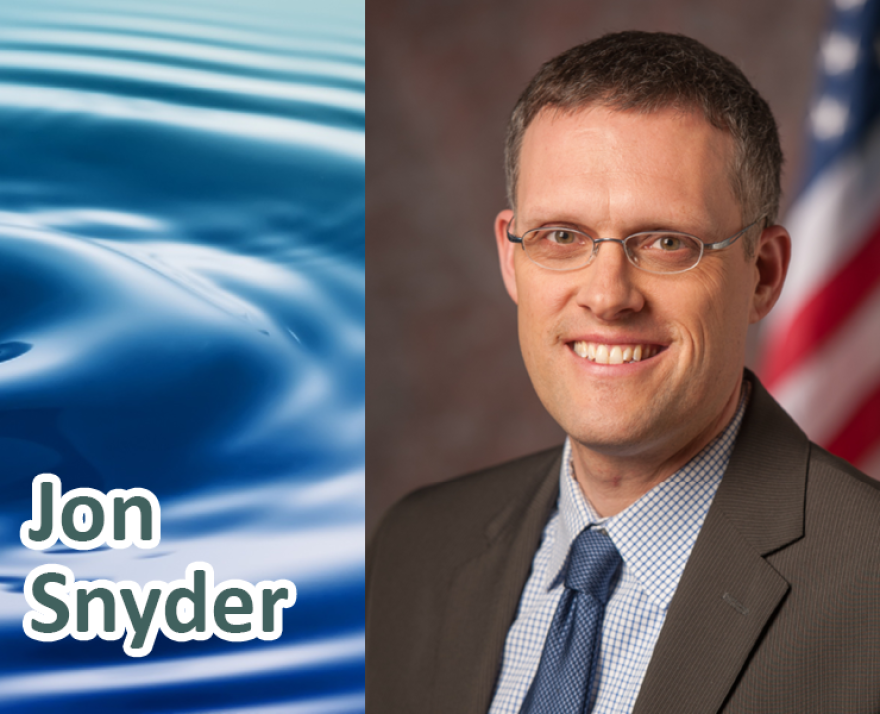SPR Reporter and regional Morning Edition Host Steve Jackson moderated a special community forum about the state of our region's water supply on Thursday Sep. 24 at the Spokane City Hall Council Chambers.
Questions were fielded by the following panelists:
- Guy Gregory, Washington Dept. of Ecology Water Resources Program
- Rob Lindsay, Spokane County Water Resources Manager
- Rachael Paschal Osborn, Center for Environmental Law Senior Policy Adviser
- Rick Romero, City of Spokane Utilities Director
- Jon Snyder, Spokane City Councilman
The forum was funded by event donor Sayre, Sayre & Fossum, Attorneys at Law and by a grant from the National Endowment for the Arts. Special thanks to producing partner CityCable5.
This year's drought conditions have seriously impacted more than recreational life in the Inland Northwest. Tourist dollars are down in communities that rely on those recreational visits. Crop damage and dry pastures are harsh realities for agriculture. Smoke from various wildfires keeps those with asthma indoors. And many climate specialists believe this is only the beginning of our water-related problems. These realities and more were addressed during this special public forum.
About the Panelists

Guy Gregory is the Technical Unit Supervisor and Senior Hydrogeologist for the Washington Department of Ecology Water Resources Program in Spokane. He has undergraduate and graduate degrees in geology, and is a licensed hydrogeologist in Washington. He and his group are responsible for gathering and interpreting data on groundwater supply conditions in Eastern Washington, acting as scientific advisors for interstate and intrastate water management initiatives, and conducting long-term hydrogeologic investigations. He was Washington’s lead for the 2007 Spokane Valley Rathdrum Prairie Aquifer study.

Rob Lindsay is the Water Resources Manager for Spokane County Utilities Division. A registered geologist, Rob has been with Spokane County since 2004. Prior to that, he was active in the engineering and environmental consulting industry, where he conducted many environmental and hydrogeologic assessments in support of transportation-related projects, solid waste facilities and contaminated sites in the northwestern U.S. and Alaska. Rob and his team have developed and conduct public outreach and education programs at the Spokane County Water Resource Center, providing a wide range of water resource educational opportunities to the community.

Rachael Paschal Osborn is a public interest lawyer assisting citizens and NGOs on water sustainability and non-profit organizational matters. She serves as senior policy advisor to the Center for Environmental Law & Policy in Seattle, and as the Spokane River Project Coordinator for the Sierra Club Upper Columbia River Group. She also teaches water law at Gonzaga Law School. She received her Environmental Studies B.A. and a J.D. from the University of Washington.

Rick Romero, Utility Division Director for City of Spokane, leads a staff of about 600 employees and manages budgets totaling more than $250 million a year, ensuring basic services that citizens rely on, including distribution of clean water, treatment of wastewater, and the collection and disposal of garbage and recycling. He led the development of a groundbreaking Integrated Clean Water Plan that will improve the health of the Spokane River and allow the City to meet Clean Water Act requirements in an environmentally and financially responsible way. Before joining the City, Rick worked for Eastern Washington University for 28 years, serving as the Associate Vice President for Business Services for the last 10 years of his career. He has master’s and bachelor’s degrees in business administration from EWU.

Councilman Jon Snyder is serving his second term as Councilman for District 2. He is the founder and former owner of the award-winning Out There Monthly magazine and co-owner of the Go Green Directory. Throughout his time on Council, Jon has been an advocate for small businesses, greater neighborhood involvement in the City planning process, good long range planning that helps stimulate economic growth and save citizens money, and increased traffic safety including better facilities for biking, walking and public transit.

